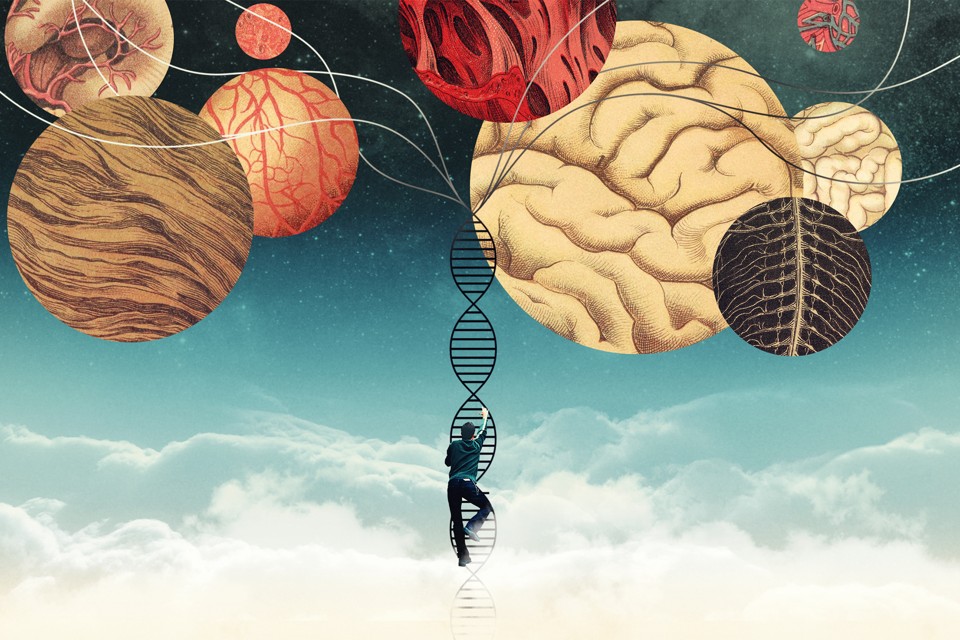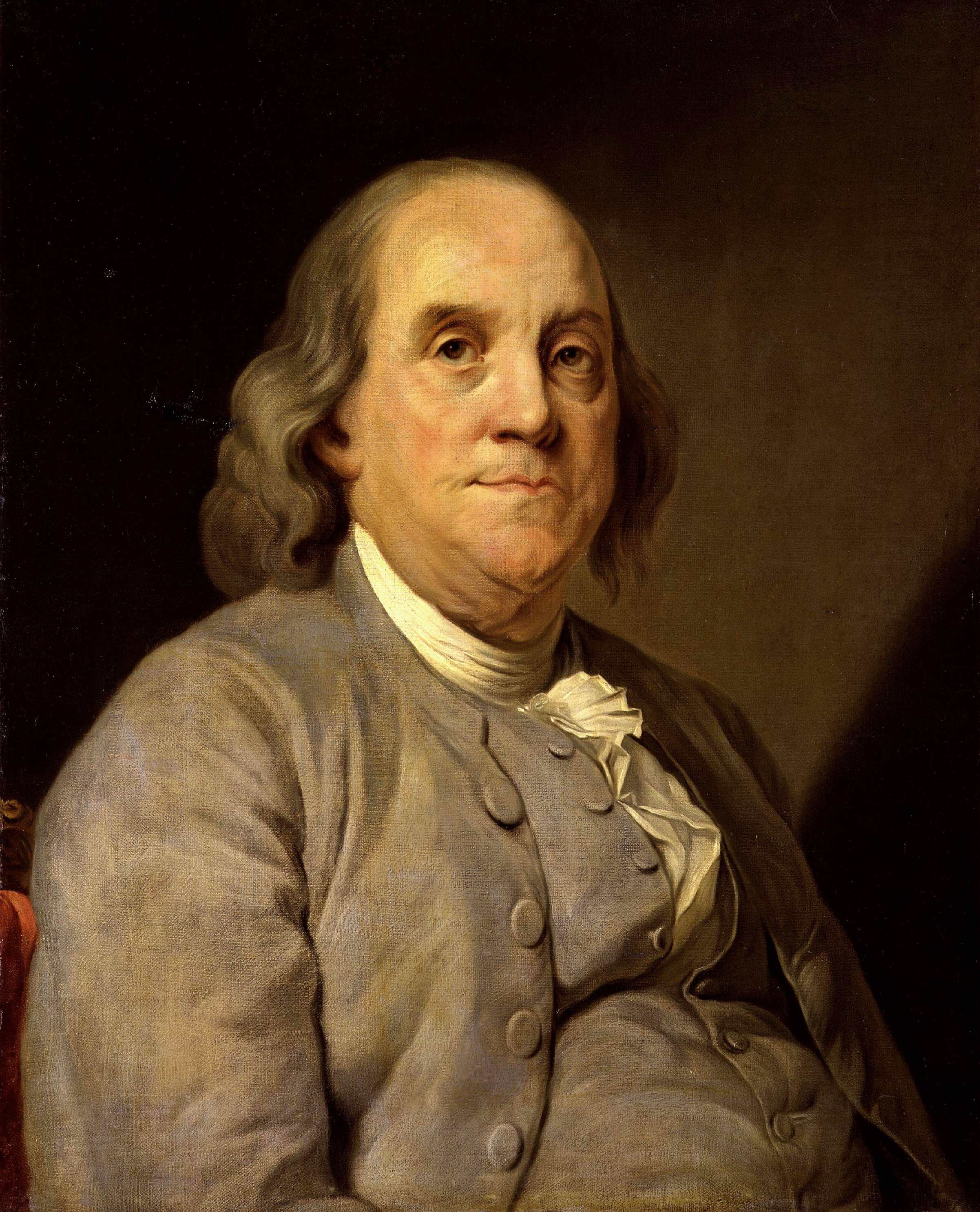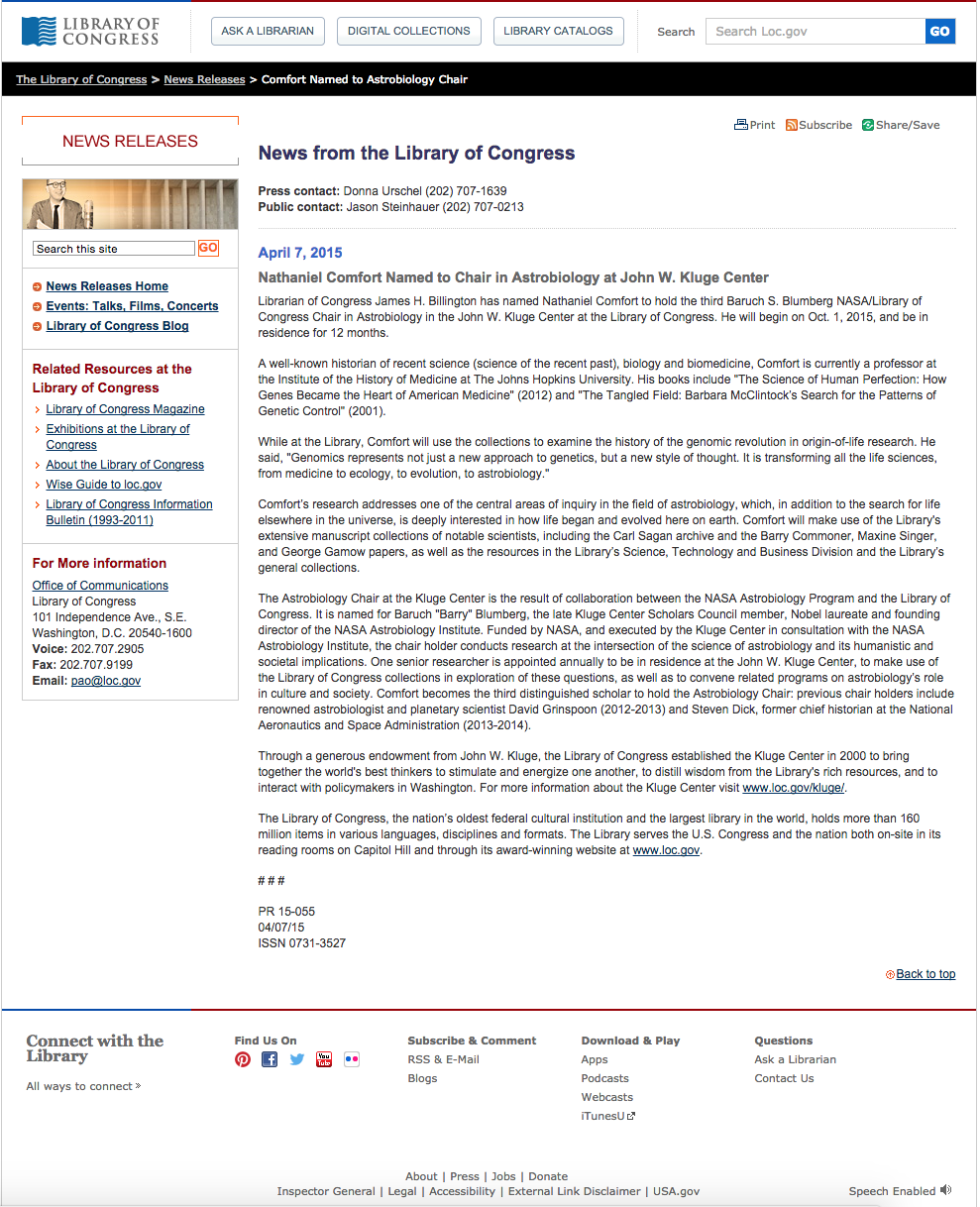GENOTOPIA: Welcome to Sideline, where we towel off the washed up and try to make them look presentable. Dr. Dick Dorkins is President and CEO of the Society for the Prevention of Intelligent design, Theology, Transcendentalism Or Other Nonsense (SPITTOON). His new meme-oir, haha, is called Me, Me: Portrait of a Selfish Geneticist. It’s a 900-page tell-all about Dorkins’s contributions to science, culture, and life. It also features lots of nice things people have said about him and many other nice things he has said, and continues to say, about himself. We just couldn’t resist inviting him to come and tell us about it. Dr. Dick, welcome to the program.
DICK DORKINS: It’s nice to have me here, isn’t it?
GT: Why, yes, of course. It seems like only yesterday that you made some geniune—
DD: I mean, you were right just then: you are fortunate. I just think it’s so important for us to recognize life’s gifts, the random generosities of the cosmos, as it were.
My book is another one. I truly believe—scratch that: I know it is the best thing I’ve ever written—which of course is saying something. Some of my closest friends agree with me. My dear friend Harold Hairnet, for example, said…pardon me, let me get my glasses… [intones]:
Bravissima! Encore, encore! Dick Dorkins’s Me, Me is the finest example of memoir since anatomically modern man last mated with a Neanderthal. Its sparkling prose and flashing wit are a perfect mirror of the towering intellect that produced it.
That’s a nice bit just there, isn’t it? There’s more:
Being a book, it is highly readable, and in addition to having pages it has even more pages, which is a most excellent and fortuitous happenstance, for they are, every man Jack of them, examples of their kind.
GT: Impressive.
DD: Well I was impressed. He adores me, and I love that quality in people. And that’s just one tiny fraction of the good things—glowing, radiant, heart-warming things—my very best friends say about me, my book, and my theories. In fact, I wrote a computer simulation to model how much my book would sell if wise, thoughtful opinions such as this spread throughout the population. It could be done with a kind of hypnosis I’ve developed in which my minions—sorry, readers—echo my ideas, thereby persuading everyone around them. I call it “lognosis,” from logos and gnosis.
Here’s how it works. Imagine that praise is a real, physical thing, like general intelligence (with which, obviously, it is correlated). Now, when I read that passage to you, you listened raptly, absorbing every word.
GT: Every word.
DD: Just so. It’s as if I transferred a gene for loving my book into your brain. It’s just like mating in bacteria: when two cells conjugate, one transfers some of its genes into the other. When it happens with ideas, I call it “thought-sex.”
GT: Thought-sex?
DD: Yes, but without the question mark—that’s a deleterious mutation you’ve made there. It does not faithfully transfer admiration of me into your nucleus Dorkins.
GT: Nucleus Dorkins?
DD: Again with the question mark! You must absorb my words exactly as your hear them, otherwise I am simply wasting my time.
GT: I am simply wasting my time.
DD: Good! Much better. By the way, if you’ll allow me a little digression (and you will), the nucleus Dorkins, a small but exceedingly important region of the brain, was described by my brilliant and—I damn it, it’s my interview, so I’ll say it—drop-dead gorgeous friend, the stunningly attractive and successful neuroscientist Andromeda Telekinesis. Anyone who says that women don’t belong in science doesn’t know Andromeda. She really pops off my pipette tip, as we used to say in the damp, dear labs at Oxbridge. Anyway, while having dinner with me one night, she discovered a nucleus in the brain that recognizes talent, wit, good looks, and achievement. And she decided then and there to name it after me. I protested, of course, but she would hear none of it. I was deeply humbled, and I say so every chance I get.
At any rate, I described my simulation in my book Unweaving the Basket. The original simply cannot be improved upon, so I shall quote. Eh-im!
I found that if I produced a memoir of staggering significance and touching sentimentality, and then had thought-sex with twenty beautiful, intelligent, influential women a day, conservatively assuming an intellectual fertility rate of fifty percent and a generation time of 24 hours, I should be able to buy that sweet little eight-person jet I’ve been eyeing in just nine months!
And do you know what? I flew here today in that very jet! That, my little friend, is the power of science.
GT: [sotto voce, sarcastically] Power of science. Pooh! [Aloud] About that…we received a call from the highway patrol and they are rather upset about the traffic jam your plane has caused on I-95. The interstates really aren’t meant to be used as runways.
DD: This is America, right? Let’s just call it a little experiment in the efficacy of prayer.
GT: With the establishment of SPITTOON, you have become one of the world’s most notorious atheists. Now, you are English by birth…
DD: —By right, damn it!
GT: Damn it! [regains composure] So my question is, why did you relocate to the United States when you founded SPITTOON?
DD: Death to America! Haha, that’s one of my wittle litticisms. But in all seriousness, I did so in order to infiltrate one of the most powerful fundamentalist states in the world. Through my ceaseless efforts of self-promotion, I have accumulated lit’rally thousands of followers who hang on my every word. My every word!
GT: Your every word?
DD: [eyes us suspiciously] Yyess. [brightens] So. I liken what I do to a kind of genetic engineering of the mind. By having thought-sex with my followers, I am indoctrinating them into the doctrine of de-indoctrination, if you will. Then they go out and explode others’ mistaken beliefs. I call them “suicide bombers of the soul.”
GT: [incredulously] Suicide bombers of the soul?
DD: [narrows eyes] Are you…?
GT: No.
DD: Good. Because if you are…
Off mike: Boss? Ever’tin’ OK? [sound of knuckles cracking]
DD: For the moment, Vinny, yes, thank you.
GT: I assure you, I would never. It’s just…isn’t that a little…inflammatory?
DD: You can’t start a forest fire without burning a few trees, what!
GT: How is that working out for you?
DD: Funnily enough, a recent independent survey by one of my graduate students found that religious fervor and hate crimes have tended to increase in towns with SPITTOON chapters compared to the general population.
GT: That ought to make you think, I imagine.
DD: Absolutely right, old sod! It makes me think, “What a wonderful confirmation of our wisdom in targeting the most populations with the most entrenched religious problems.” We are right where they need us!
GT: What about in East Carolina, where the young man blew himself up, killing two young Muslims, and citing your influence in his suicide note?
DD: Mm, unfortunate, that. Wasn’t meant to be taken quite so lit’rally. But my followers are passionate people! They believe in disbelief!
GT: Unbelievable. I’d like to go back a bit now, to a different crusade: the so-called sociobiology wars of the 1980s. What exactly was your beef with scientists such as Popinjay Gould?
DD: As I wrote in what I consider my least-appreciated book, The Gould Delusion, they made one of the classic errors of science: they let their ideology color their work. They believed things and then did science, instead of doing science and then knowing things, as I do.
GT: So you bring no beliefs, no values, no opinions whatsoever to your science?
DD: Positively not! I have no beliefs—only certainties.
GT: Have you ever changed your mind on anything?
DD: Nope. Wait a minute—yes. I do remember once back when I was an undergraduate. My philosophy professor was introducing us to Einstein’s concept of gedankenexperimenten—that’s “thought experiments,” for the philistines in the audience—and mine was to try to change my mind. I halfway succeeded for a moment, but then my mind snapped back again, like the steel trap that it metaphorically is. I was just too strong for myself, haha!
GT: [sound of hand slamming table] Right. That’s enough. This conversation is repetitive, pointless, and vacuous. You’re just smugly self-indulgent and vain, and you keep bashing away at the one or two really original things you’ve ever said, thirty years ago.
[Enter VINNY SMALLCHANGE, a 350-lb. bouncer, in black suit, dark glasses, and with suspicious bulge in his pants.]
VS: Just too strong for myself. Hey-uh, Dr. Dick. Dis guy botherin’ ya? I can take his microphone from his mout’ and insert it in another orifice, if y’ get my drift.
DD: What a brilliant analysis, Vinny! Bravo! But I’m afraid I cannot stand by and watch violence carried out, especially on my behalf. So I’ll just turn around and inspect this utterly fascinating fly on the wall there…
GT: Ha. Ha. Well! Look at the time. I’m afraid we’re going to have to wrap up. Dr. Dick, I’d like to thank you for being on Sideline. G’bye!
DD: It’s been a pleasure having me.
VS: […]
The preceding is for entertainment purposes only. Any resemblance to vertebrates living or fossilized is completely coincidental.
Like this:
Like Loading...





 Nature has posted
Nature has posted 
 Why astrobiology? My next project is a biography of DNA. One key part of the book will be the story of how we’ve come to understand the origins of DNA and the origin of life in an RNA world. So I’ll be using the unparalleled resources of the Library to write the history of origins research since the genome project, as well as working on the rest of the book.
Why astrobiology? My next project is a biography of DNA. One key part of the book will be the story of how we’ve come to understand the origins of DNA and the origin of life in an RNA world. So I’ll be using the unparalleled resources of the Library to write the history of origins research since the genome project, as well as working on the rest of the book.
You must be logged in to post a comment.